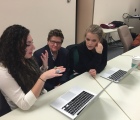
The Fall 2016 edition of Leadership: Journal of Post-secondary Leaders just published a new article called Flipping by Design. This article, written by me, lays out some tips for integrating cutting-edge cognitive science into the design of a flipped classroom. In the piece, I call for a reframing of flipped classrooms based on a pervasive (and destructive) widespread lack of definitional clarity […]







